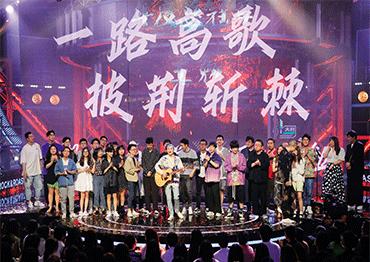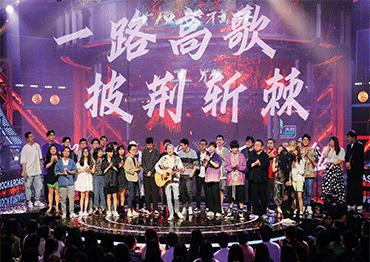While Wong inspired and supported China’s first wave of stand-up comics, it was a witty 31-year-old from the Inner Mongolia Autonomous Region that nurtured the soul of Chinese stand-up comedy.
Li Dan loved literature and had dreams of becoming an author. He also loved the American TV show Seinfeld. “My first encounter with stand-up comedy was in my childhood. One of my favorite cartoon characters would imitate Jerry Seinfeld doing stand-up,” Li told NewsChina.
While in college, Li gained a following on Sina Weibo for posting jokes and stories.
In May 2012, Tonight 80’s Talk Show, China’s first stand-up centric show, aired on Dragon TV. Li was hired as a staff writer and soon became a regular performer.
“Li Dan is a genius. He thinks of jokes and puns super quickly. He can keep talking and talking without stopping, so the script gets done in a few minutes,” said Cheng, who worked on the show’s production crew.
In 2014, Li and three others founded Xiaoguo Culture. A small group of stand-up comedians and producers including Cheng Lu, Wang Jianguo and Chi Zi, joined the company.
“There was no stand-up industry in China when we started the company, so we attempted to create one,” Li told NewsChina. “Our company has lots of divisions that may sound quite weird and seem irrelevant to one another. That’s because we have to explore all the possibilities of this new industry. In other countries, such wide-ranging businesses aren’t done by a single company. But in China, there’s only one company. We have to rely on ourselves and try everything.”
In 2015, a ripped, subtitled version of the Comedy Central Roast of Canadian pop star Justin Bieber circulated on the Chinese internet. Former roastees on the show included a pre-presidential Donald Trump during his days on reality TV show The Apprentice. Xiaoguo Culture saw huge potential.
Their show, Roast, premiered on leading online video and livestreaming platform Tencent Video in January 2017.
Like the Comedy Central version, a panel of comedians and celebs take turns pummelling the guest in the hot seat, who then gets a chance to return the favor. The rounds of roasting are cut with candid, more emotional stories of their life difficulties and career challenges. It was a welcome forum for non-comedian celebrities to show off their sense of humor while poking fun at themselves.
Li Dan was a producer, head writer and regular performer on the show.
Roast was a huge hit. According to statistics from entertainment industry research firm Endata, Roast had 100 million views in its premiere week and 1.4 billion views after its first season finale in March 2017.
In August 2017, Xiaoguo Culture’s follow-up Rock & Roast premiered on Tencent Video. However, instead of featuring professional comedians, Rock & Roast gave the spotlight to aspiring amateurs.
In weekly episodes, comedians performed 10-minute routines for a panel of celebrity judges. A live audience casts votes, and the leaders faced off in a final round for the title of “roast king.”
Most comedians drew material from shared experiences. But perhaps more significantly, the show was an outlet to openly vent about social issues such as China’s poor work-life balance and overtime abuses, feelings of helplessness amid high living costs, anxiety and frustration over decreasing social mobility, and anger towards social inequalities and injustices.
The show gathered 1.2 billion views and stirred discussions on social media.
Kong Degang, a literary critic and lecturer at Nanjing Normal University, said that humor is not the only factor driving stand-up’s popularity in China.
“Emotional resonance takes priority,” Kong told NewsChina. “Chinese audiences’ longing for that resonance transcends their interest in the art itself. The comedy is secondary, while eliciting emotional resonance - usually negative emotions - from the general public is the principal concern of performers.”
“Accordingly, stand-up comedians carefully calculate their own images and opinions to relate to their audience and make them believe [the performer] is one of us, and speaks for us,” Kong said.

 Old Version
Old Version
